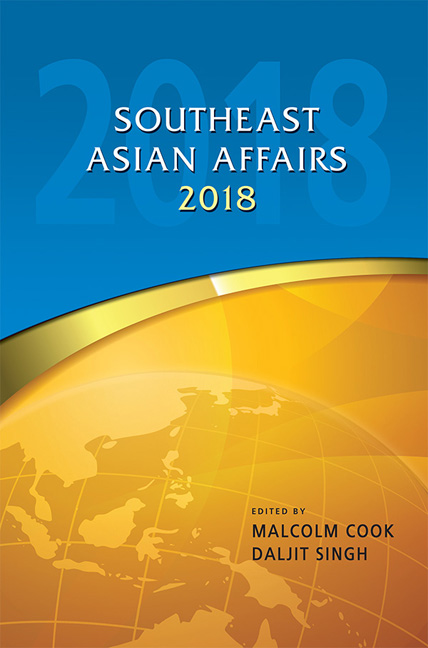Book contents
- Frontmatter
- Contents
- Introduction
- Acknowledgements
- THE REGION
- Notes on the Future of Southeast Asian Studies
- Southeast Asia on the Economic Front: Holding Steady, Bracing for Change
- Year One of the Trump Administration's Policy: Uncertainty and Continuity
- Southeast Asia in 2017: Grappling with Uncertainty
- BRUNEI DARUSSALAM
- CAMBODIA
- INDONESIA
- LAOS
- MALAYSIA
- MYANMAR
- THE PHILIPPINES
- SINGAPORE
- THAILAND
- TIMOR-LESTE
- VIETNAM
Notes on the Future of Southeast Asian Studies
from THE REGION
Published online by Cambridge University Press: 08 June 2019
- Frontmatter
- Contents
- Introduction
- Acknowledgements
- THE REGION
- Notes on the Future of Southeast Asian Studies
- Southeast Asia on the Economic Front: Holding Steady, Bracing for Change
- Year One of the Trump Administration's Policy: Uncertainty and Continuity
- Southeast Asia in 2017: Grappling with Uncertainty
- BRUNEI DARUSSALAM
- CAMBODIA
- INDONESIA
- LAOS
- MALAYSIA
- MYANMAR
- THE PHILIPPINES
- SINGAPORE
- THAILAND
- TIMOR-LESTE
- VIETNAM
Summary
Looking Back
When done poorly, efforts to understand and explain other cultures and societies earn justified and withering critique. Where scholarly appreciation lacks empathy, depth or context it is not a surprise that opposition should emerge. The charge of orientalism is one that still echoes through the halls of knowledge. It is a blunt rebuke to those accused of reifying the Other. Avoiding the common tendencies to essentialize complex subject matter requires skill, breadth and compassion. The political situation in which studies of human societies occur is crucial, and the difficult reality is that neutral enquiry, of the type imagined in some methodological textbooks, always proves an illusion. Academic analysis, of whatever type, should begin with an appreciation that power and knowledge sit in uneasy and permanent conversation. Knowledge of society, politics, culture, history, language and economics, in whichever disciplinary tradition, should therefore start with questions about how the world works, including through close scrutiny of scholarly practices and mentalities.
It was in such a quest, for academic and practical knowledge, that what we now recognize as Southeast Asian Studies emerged after the Second World War, just as a new region emerged from the colonial shadows. The colonial machines transplanted to this region from Britain, France, the Netherlands and the United States had, in their time, devoted immense energy to research enquiries that helped secure their exploitative rule. But, from the 1950s, the new nation-states of this region — wedged between China and India — found themselves the subjects of a new type of concerted analytical attention. Interest in such Area Studies increased with Cold War competition between the Soviet Union and the United States, and with Southeast Asia's rolling, often violent, struggles for independence and ideological direction.
During the second half of the twentieth century, a Southeast Asian core coalesced, initially, around a group of societies with relatively consistent pro-Western policies — Indonesia, Singapore, Malaysia, Thailand and the Philippines — ruled by various styles of nationalist strongmen. These five countries came together in 1967 as the Association of Southeast Asian Nations, marking a key moment in nation-building and region-building projects.
- Type
- Chapter
- Information
- Southeast Asian Affairs 2018 , pp. 3 - 18Publisher: ISEAS–Yusof Ishak InstitutePrint publication year: 2018



